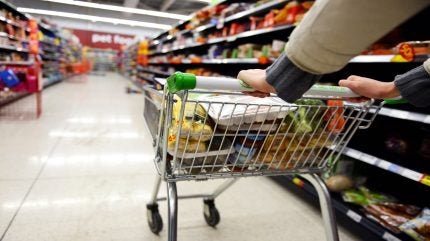
The UK Consumer Prices Index (CPI) increased by 3.4% over the 12 months ended May 2025, a slight decline from the 3.5% rise in the year leading up to April, according to data released by the Office for National Statistics (ONS).
May saw a CPI increase of 0.2%, marginally lower than the 0.3% increase recorded in May of the previous year.

Discover B2B Marketing That Performs
Combine business intelligence and editorial excellence to reach engaged professionals across 36 leading media platforms.
The most significant decrease in the monthly variation of the CPI annual rate was attributed to the transport sector. Upward pressures on the rate were primarily driven by increases in the food sector, along with furniture and household goods.
Core CPI, which excludes the volatile categories of energy, food, alcohol and tobacco, saw a 3.5% increase in the year ending in May – a decrease from the 3.8% rise recorded in the year to April.
The annual rate for CPI goods climbed from 1.7% to 2.0%, while the annual rate for CPI services decelerated from 5.4% to 4.7%.
British Retail Consortium director of Insight Kris Hamer stated: “Headline inflation held at 3.4% as higher bills and new business costs introduced in April continued to filter through into the economy. Worryingly for consumers, the price of the weekly shop rose once again as food inflation continued its upward trajectory, reaching its highest level since February last year. However, there were some bright spots. Deflation persisted in the clothing and footwear category and within the food category breakfast items such as eggs, bread and cereals fell in price on the month, offering some relief.”

US Tariffs are shifting - will you react or anticipate?
Don’t let policy changes catch you off guard. Stay proactive with real-time data and expert analysis.
By GlobalDataNegative impacts from various sectors were somewhat counterbalanced by the rising costs of food and non-alcoholic beverages, which saw a 4.4% price increase over the 12 months to May, an acceleration from the 3.4% increase in the preceding year to April.
This rate for May is the highest since February 2024, when it reached 5%.
In terms of monthly changes, prices for food and non-alcoholic beverages climbed by 0.7% in May, contrasting with a decrease of 0.3% during the same month in the previous year.
Hamer added: “Since October, retailers have warned that the costs from the Chancellor’s [October 2024] Budget could not be fully absorbed and would inevitably lead to higher prices for shoppers. Food inflation is now above 4% and looks set to increase further later in the year. The government must now take action to relieve cost pressures retailers are facing. Ensuring no shop pays more under business rates reform would be a meaningful step forward, offering much needed relief to an industry that continues to see prices, job losses and store closures all rising.”





